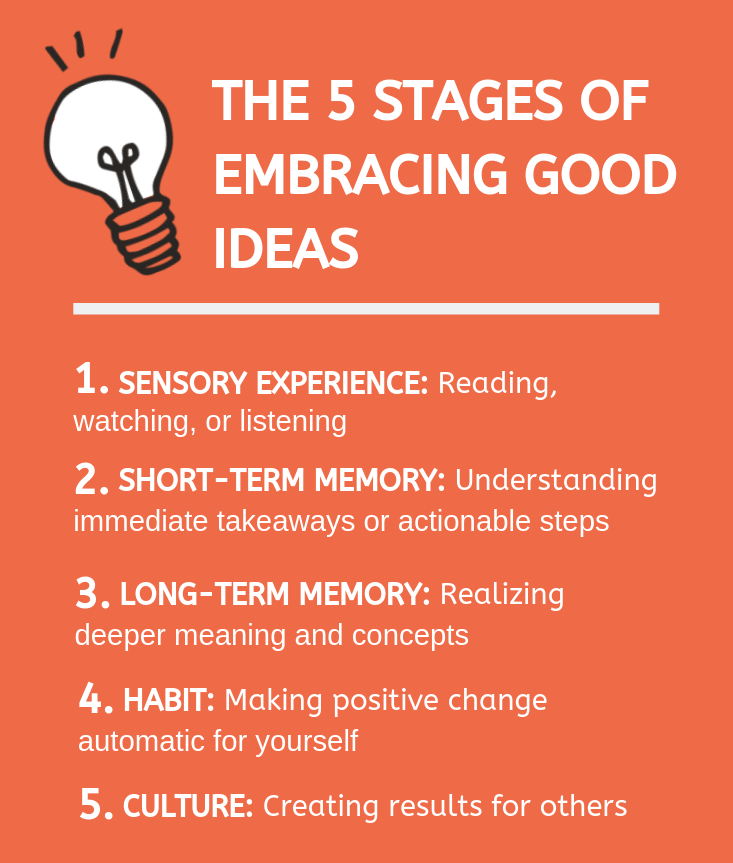As a coach, I am often asked by clients how I improve personally. The answer, consistently, is to be consistent. I develop strategies to solve big pieces of the life puzzle, and then turn these basic practices into habits and, ultimately, the culture of the people around me in my family and organization.
Before we look at five specific areas that will allow you to bring strategic excellence into your life, let’s first apply some basic principles to your thinking process so you can get more out of this article and anything you read in the future.
Let’s say you read a great book or article, and you love it. Then one year later you come across the same book or article, and you can’t remember what you liked about it in the first place. Even worse, you can’t remember the specific takeaways or anything that you learned. There’s a reason this great material now seems so foreign to you: You did not move the ideas from short-term memory to long-term memory, from long-term memory to habit. If you’re part of a team that would benefit from the article or book, you didn’t move the takeaways from habit to culture, which would help everyone around you.
What was the point of reading it in the first place if you weren’t going to let the great ideas effect positive change in your life?
What you want to do is deliberately go from short-term memory to long-term memory by repeating it, talking about it, using it, and applying it, so it becomes an everyday action, a habit. And if all the people around you are doing the same thing, you’ve reached the fifth level, which is family, organizational or workplace culture.
So when you apply strategy to your thinking and learning, you move from just hearing about a cool concept to enabling yourself and the people who matter to you to get the best impact from it.
But that’s not the only way to be strategic and produce results for yourself and those around you. You can bring deliberate practices to other essential areas of your life, including the following four.
Connections
I go back 30 years with my friend and business partner Ron Lusk. This man knows everyone—everyone! He is so well-liked and connected that it makes you step back and say, “How can he be that powerful?” And the answer is, he is consistent and strategic about meeting people and keeping connections.
Health
Your daily health routine could include things like taking supplements. It could include a workout, a stretch, drinking a healthy shake, or eating a certain type of food. It could also include a meditation or a prayer. I recommend all of the above.
Planning
I recommend that you have a consistent approach to setting your long-term goals, then your monthly, weekly, and daily goals that support your long-term goals. Then, if you’re consistent at looking at your daily list of things to do that support those goals, you’re deliberately allowing your brain to attract, if you will, the things that are important to you so your goals become realities. Some people don’t set goals, and some people set goals and just keep them in their minds. I propose that if you write your goals down, visualize them and utilize good self-talk, all on a consistent basis, you’ll find all kinds of wins, because you’re being diligent about your planning.
Appreciation
You’ll probably never hear someone say, “Stop appreciating me,” because everyone loves being appreciated. Strategically, thoughtfully and consistently looking for ways to appreciate people is a very powerful concept. I personally send notes of appreciation to as many people in my life and career as possible, as often as possible. I hand write cards to my kids and my wife. I do my best to consistently look for ways to express my appreciation for people, whether it’s through cards, emails, or texts, and I encourage you to do the same thing.
Being strategic in all these areas can have a very powerful impact. Of course, you can apply similar practices to many other areas in your personal and professional lives, and you should. Remember, being deliberate and strategic starts with awareness (sensory experience), and develops into short-term memory, long-term memory, and eventually into habit, and if you’re really doing things right, culture.

This article originally appeared in the September/October 2019 issue of SUCCESS magazine.
Photo by GaudiLab / Shutterstock.com











